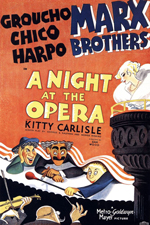
Released: 1935
Starring: The Marx Brothers, Margaret Dumont, Kitty Carlisle, Allan Jones
Director: Sam Wood
Distributed by: MGM
“Don’t miss it! The funniest movie ever made!”
The Marx Brothers, Groucho, Chico, and Harpo are one of film history’s legendary comedy groups. In A Night at the Opera from MGM we see two things happen in their careers. The first is the reduction of their group from four brothers to three, with brother Zeppo leaving the group to become an agent. The second is a change in the way the characters deliver their comedy and using it to help build the film’s story which differs from earlier films at Paramount. However, these changes gave the Marx Brothers one of the best comedies of all time.
The laughs of the film start almost immediately as we meet Mrs. Claypool (Margaret Dumont) sitting in a restaurant waiting for her guest to arrive so they can have dinner. After asking the waiter to page Mr. Otis B. Driftwood (Groucho Marx), who stands up and berates the waiter for yelling out his name throughout the restaurant. We discover that not only was he sitting right behind Mrs. Claypool the whole time but that he has already eaten dinner with another woman. With his wit, charm, and tactlessness Driftwood is able to not only diffuse the upset Mrs. Claypool, but to heavily imply it may have been her fault in the first place. When she states how long she has been sitting and waiting he replies, “Yes with your back to me. When I invite a woman to dinner I expect her to look at my face. That’s the price she has to pay.” This is the type of humor laced with insult that is Groucho’s bread and butter and what he uses throughout not only this but all his films.
Mrs. Claypool wants to use her wealth to buy her way into society and Driftwood suggests that she accomplish this by investing in the New York Opera Company. He introduces her to a representative, Herman Gottlieb (Sig Ruman), who is quickly placed as the focus of most of Driftwood’s insults and humor. We are brought to an opera house and are introduced to all the other characters in the film including the childlike mute Tomasso (Harpo), the charming Fiorello (Chico), and our non-comedy actors whom the core plot actually revolves around. Rodolfo Lassparri (Walter Woolf King) is offered a debut in New York and chooses his leading lady to be Rosa Castaldi (Kitty Carlisle) trying to lure her away from her lover, Ricardo Baroni (Allan Jones). Lassparri is established as a villain immediately; beating his dresser Tomasso as soon as he is on the scene and displaying a two-faced persona when he is confronted with Rosa.
Though many hijinks from the Marx Brothers and highs and lows for Ricardo and Rosa, the audience is taken on the film’s entire journey from Italy to America and the opening night at the New York Opera Company. That night the brothers have to get Ricardo to replace Lassparri as the lead tenor to prove he is the better singer, help Rosa regain her leading lady spot, and Driftwood needs to regain his position with Mrs. Claypool and the opera company.
The best aspects of The Marx Brothers are heavily present in this film. Their form of comedy evolves from their vaudevillian roots where a performer had to develop different talents and adapt to situations that arose in the theater to keep the live audience entertained. Their comedy style includes slapstick, situational, banter, insults, improv, pantomime and even breaking the fourth wall. Unique to this film was their ability to use it all and make it flow effortlessly from scene to scene. I still think earlier Marx Brothers’ films were still hysterical and classic, but sometimes their comedy didn’t always fit into the scene or plot of the film, making it appear as if each scene was written separately as a comedy bit and then sewn together with a loose plot to connect it all together. Whereas, in A Night at the Opera, the comedy never pulls you out of the movie or makes the Marx Brothers feel separate from the actual plot of the film.
This change has been attributed to the producer of the film, Irving Thalberg. His ideas for story layout allowed the Marx Brothers to continue their zany antics, but also to be sympathetic characters. This sympathy was accomplished by making sure that there was a moment in the film that nothing was going their way followed by the brothers rallying and coming up with a plan to reverse their situations. Another thing that is credited to Thalberg is having the Marx Brothers test the jokes and gags from the film at vaudeville shows to see what worked and what didn’t. This allowed not only for the jokes to be tested but to see how long a laugh they would get which would allow them to time the jokes in the film better.
I absolutely love so many things about this film. The film has many musical numbers from singing to simply instrument pieces by The Marx Brothers. All the brothers were talented musicians and it shows in the film. Chico’s style playing on the piano is both entertaining to watch as he hits the keys with his finger guns. And, as Harpo plays the harp you can see him transform from a pantomiming clown into a serious performer. From the first note to the last Harpo is intensely focused on the music. They are both not only fun to watch, but the music is great to listen to. Unfortunately, even though Groucho could play guitar, we don’t see it in this film. The opera singers all have multiple songs and perform them well. Allan Jones and Kitty Carlisle’s duets are enchanting as they sing to each other.
The Marx Brothers each have their own unique style and characters but play off each other so well. Chico is a charming Italian who while sometimes displaying an uneducated background, is able to outwit most of his comedy targets. Harpo’s ability to pantomime and use props for his humor can bring any dead moment into a full riot of humor. And finally, Groucho’s ability to totally use a single line to completely disarm a victim of his insulting humor has earned him the title “King of One-liners” among many comedic actors. When all three enter a scene, you never know what is going to happen, but you know it is going to be funny and magical.
There are two scenes that have been referenced and paid homage to many times in the years since they were filmed. They are the contract scene between Chico and Groucho and the stateroom scene on the boat. In the contract scene, you will see the brilliant humorous banter between Groucho and Chico over the signing of a contract. The stateroom scene is a perfect example of slapstick comedy as a small room on a ship is overflowed with occupants. These have been referred to as legendary examples of comedy and are still funny to this day.
The quality of the film production is high compared to the Marx Brothers films at Paramount. With advancing technology in film, images are sharper with better contrast and sound is crisp and clear. Sets look more like locations and less like stage sets and lighting also improves with shadows still showing detail and bright areas not being blown out.
The Marx Brothers have been my comedy idols since I was a child with Groucho specifically teaching me how to analyze a situation and quickly insert a quip (mine are not anywhere near as funny as his). However, while I could write indefinitely about how awesome The Marx Brothers are and how good this film is, there are some drawbacks in this film. There are large continuity errors from the placement of clothing and props to the movement of characters in the film. At one point, Ricardo is on a pier singing to Rosa who is on a ship. The ship takes off as the song is finishing up. Suddenly we find Ricardo stowed away in Driftwood’s trunk. How to did he get there if the boat was leaving and he was still on the pier? There are also a few dialogue errors that made it into the film, but can be looked past quickly as they don’t hurt or help the scenes they are in. Finally, this film is over 80 years old and while a lot of the jokes and bits are still humorous, there may be a few that are dated and not relatable to many modern audiences.
Even with these faults, I will say with confidence that if you love a good comedy or consider yourself a film connoisseur, you need to not only see this film once but many, many times. So sit back in the comfort of your couch, enjoy the film, and save me some popcorn!
Rating:
Jack Savage:
In my opinion, one of the funniest comedies ever made. I can watch this on loop and never get bored. Witty, entertaining, and memorable.





Seda Faran:
An early, nostalgic film, it’s all vaudeville slapstick and plenty of musical numbers that modern audiences may find too long and boring. The highlight of the film is the comical Hotel Room’s Wandering Furniture scene. Overall, I find it sometimes boring, but occasionally entertaining. Certainly not a film I would ever purchase, but would put on as background noise.


The best of the Marx Brothers’ films. I could watch this time and again. I especially love the shipboard scene where Allan Jones sings, and Harpo and Chico play.